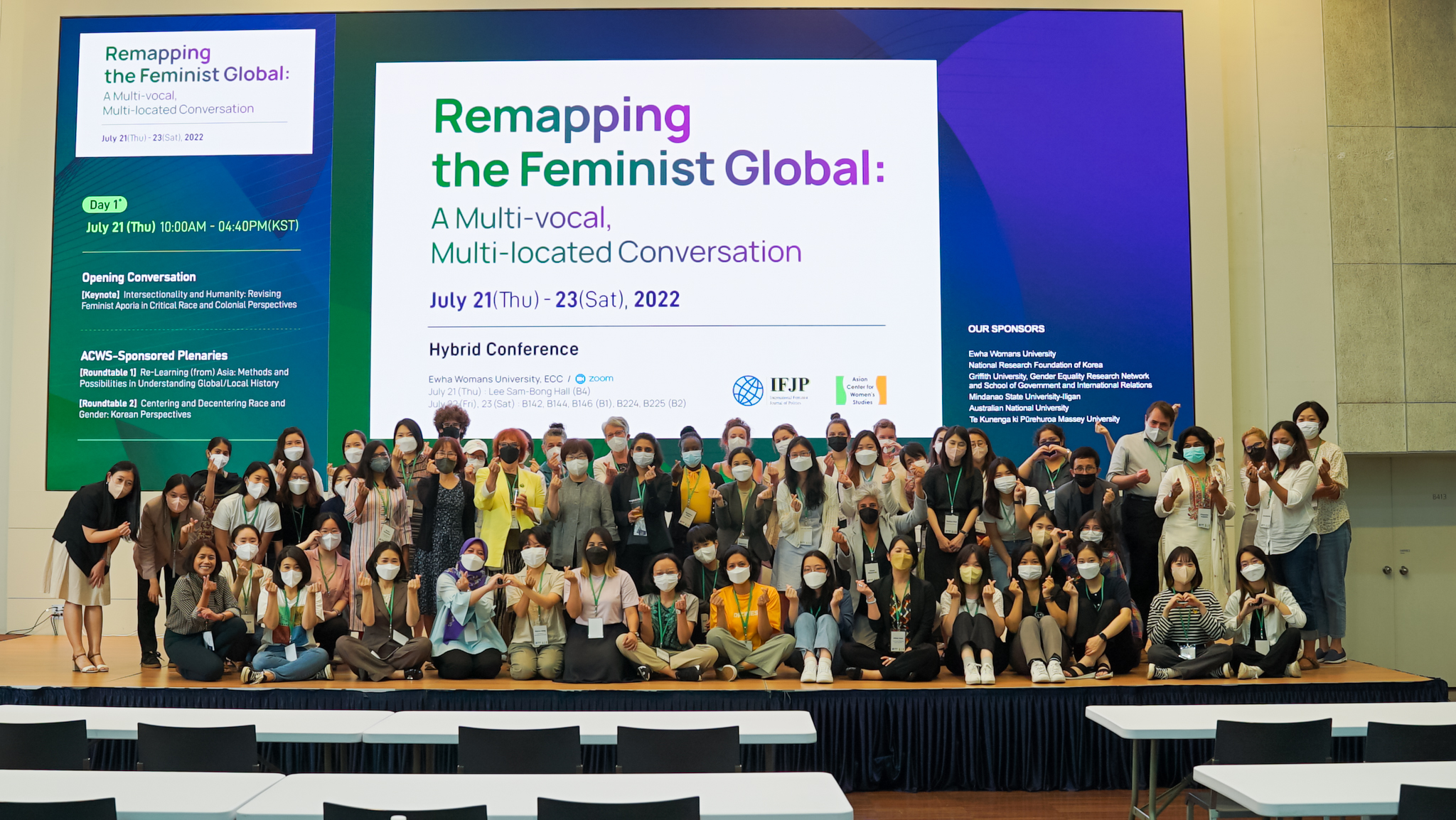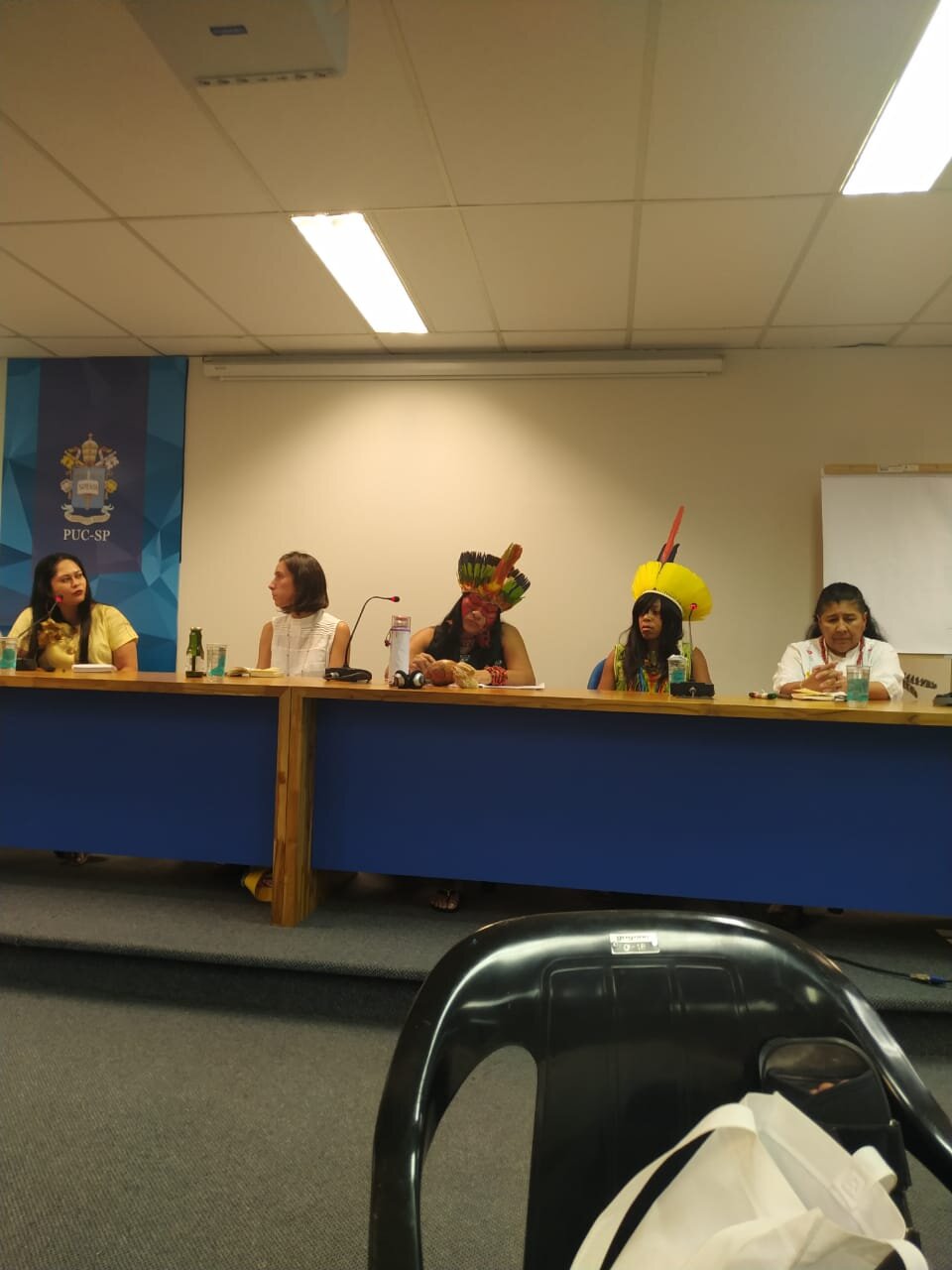Conferences
2024 conference
Digitalisation, AI and Feminist Futures
A Joint Hybrid Conference of Feminist Africa and the International Feminist Journal of Politics
Maputo, Mozambique, and online, July 25 to 28, 2024
The 2024 conference is co-convened by IFJP and Feminist Africa and will take place in Maputo, Mozanbique, from 25-28 July 2024.
2023 conference
“Constructing Transnational Feminist Resistances in Times of ‘Crises’”
The 2023 conference is co-convened by IFJP and FLACSO Ecuador and will take place in Quito, Ecuador, on September 7-8, 2023.
We are inviting individual and co-authored papers, panels, roundtables, book launch proposals, and other creative proposals under the theme Constructing Transnational Feminist Resistances in Times of ‘Crises’.
We no longer accept submissions.
View call for submissions in English
View call for submissions in Spanish
View call for submissions in Portuguese
2022 Conference "Remapping the Feminist Global: A Multi-vocal, Multi-located Conversation"
The 2022 conference is co-convened by IFJP and the Asian Center for Women’s Studies at Ewha Womans University and will take place in South Korea in a hybrid format from 21-23 July 2022.
We are inviting individual and co-authored papers, panels, roundtables, book launch proposals, and other creative proposals under the theme, Remapping the Feminist Global: A Multi-vocal, Multi-located Conversation.
The deadline for submission is 28 February 2022.
2021 CONFERENCE
The 10th Annual IFJP conference
"Feminist Connections in Global Politics"
was held fully virtually from February 17–20, 2021
View the Program here
CHECK OUT WHAT was SAID ON TWITTER AT #IFJP2021
Theme Call for Papers
Distance has been one of the catchwords of the year 2020. People have been pushed apart by fear and precaution, though those from the Global South, who have long been marginalized from epistemic communities based in the Global North, are familiar with having their movements be restricted by others’ fear. Nevertheless, scholars across the globe feel more isolated than ever, stemming from both the restrictions on social contact resulting from the pandemic and the rapid changes in our communities that this modified behavior has caused. Feminist scholars have, however, already thought about distance and connection. Feminists have long studied the marginalized as well as the powerful in many contexts, and feminist scholars are aware of the impact of the digitally networked world and how it can substantially change the historical terms and conditions of gendered power (Harcourt 2015). This distanced yet digitally connected period also brings new insights into feminist epistemology, which has sought “to build understanding of the connections between the local and global, between the micropolitics of subjectivity and everyday life, and the macropolitics of global political economy” (Mama 2004, 122).
Feminist scholarship in International Relations has been at the forefront of investigating the interconnectivity of people, places, events, and discourses and narratives (Ackerly and True 2019), but the present moments in global politics demonstrate that there is more to be done. In this light, the thematic focus of this conference is on feminist connections in global politics, whether that be the connections that feminists IR scholars make or the connections between feminists themselves across organizations, sites, and crises. We encourage submission that seek not only to theorize such connections but also to explore how connections break down. The conference will highlight connections and collaborations among scholars as well as between scholars and the students they teach, practitioners, and activists, noting how feminist methodologies and pedagogies highlight the importance of connection between individuals, communities, and species (Fredlund, Hauman and Ouellette 2020).
Potential contributors may wish to consider the following questions:
How can feminist IR theories help illuminate connections—sustained or broken—among individuals, states, non-state actors, economies, bodies, and other concepts within global politics?
What lessons can we apply from feminist IR scholarship to the present? Can research on conflict or economic stagnation inform global understandings of COVID-19? Does the current global pandemic shed light on other topics in global politics?
How do global social movements thrive in a world of social isolation? Can anti-patriarchy, anti-racist, and anti-colonialist actions be sustained beyond their primary catalysts?
What will be the impact of distance on international collaborations? Is the study of global politics particularly affected by limited travel and interactions, or does digital access bridge the divide created by financial limits, border controls, and visa schemes?
What is gained and what is lost in losing physical connections? Do the opportunities afforded by virtual connections make up for this?
How can feminist scholars leverage their connections/connectivity to support their non-academic co-collaborators, including practitioners and activists?
How can feminist professors of global politics adapt their pedagogies to a partially or fully online context? Can such a move generate connections in our teaching? What do we lose when we do not teach face to face?
By offering a fully virtual conference experience, this conference creates a platform to share knowledge and mobilize collectively across boundaries, disciplines, and time zones. Presentations can be pre-recorded (details provided after acceptance to the conference program), and we will also provide spaces to chat and post questions during and after panels. We intend to group presentations by time zone so that all attendees have the opportunity to join at least some sessions live. We hope that this setup enables students and scholars from the Global South and North alike to benefit from the sharing of ideas at a time when many are unable to travel due to restrictions, health concerns, and limited funds.
PAST CONFERENCES
2020 Conference
The 9th Annual IFJP conference
”Subversions and Solidarities through Feminist Collaborations and Crossings”
was held at Vanderbilt University (USA) from March 6-7, 2020.
Program
Check out what was Said on Twitter at #IFJP2020
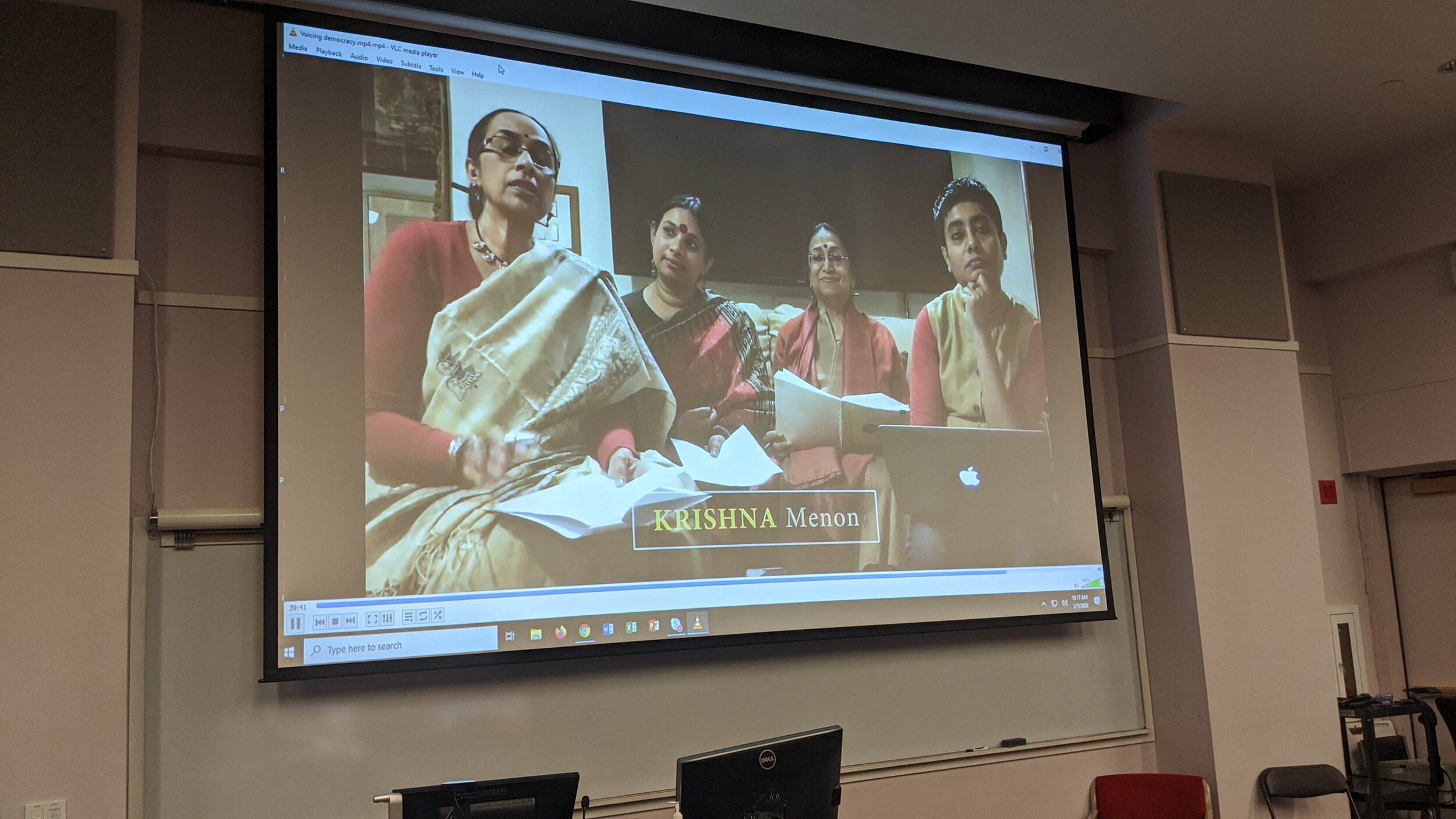

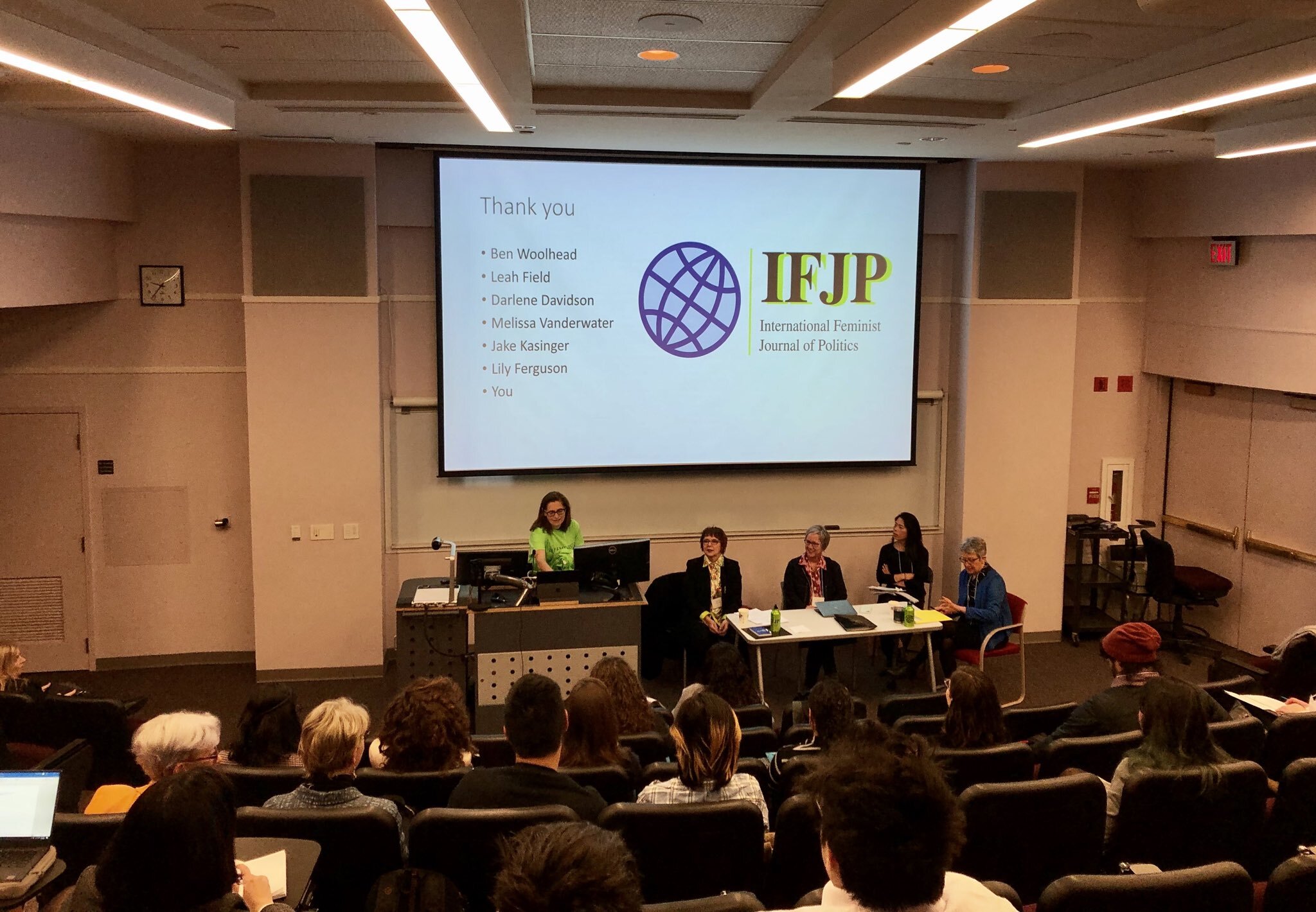
Theme Call for Papers
This conference seeks to bring together scholars and practitioners for an interdisciplinary, global exploration of how feminist scholars of gender work with the challenges of differences. We welcome submissions that address this topic substantively and methodologically, in theory and in practice, in our engagement and in our play.
Questions that might be considered include:
What are the political implications across and for differences of the metaphors and framings we use to talk about differences, including (in English) crossings, bridging, insider-outsider, outsider within, lugar de fala, 求同存异, sororidad en la diversidad, (send us yours so that we can update the call)…
What do we mean by difference? Visible and invisible axes of political difference, including class, caste, race, color, national or ethnic origin, age, disability, sex, sexual orientation, gender identity, gender expression, religion, military service, incarceration, or genetic information.
If we think that Audre Lorde is right about the “creative function of difference in our lives,” why is collaboration across difference a persistent challenge?
How do women’s and/or feminist movements and social movements that center gender collaborate across differences?
How do academics collaborate across differences?
What is collaboration? What might it mean or look like?
What are the possibilities for collaboration between activists and academics?
What theories are manifest in the work of women’s movement organizations?
What are the seeds of successful collaboration and solidarity?
How do women’s movements build alliances and bridges?
What are the practical implications of feminist research in any arena?
Is policy impact important for us? If so, in what ways?
Proposals are encouraged from/about any continent, field, and issue area. We are also open to diverse methodological frames. We particularly encourage collaborative proposals: papers by co-authors, co-authors who cross difference, activist/academic co-workers, and feminists in the policy space and full panel submissions. Would you like to meet a feminist on our editorial board or international advisory board and be on a panel with them? Contact someone and share your interests. Assembling an IFJP proposal is an opportunity to cross boundaries and build solidarities.
2019 Polycentric Conferences
Our 2019 “polycentric” IFJP conferences took place in two locations in Latin America - Mexico & Brazil. The conference organizers for each site planned distinct formats to explore critical themes of transnational feminist interest: gender, violence, and feminist resistance, particularly to right-wing governments and movements.
The conferences included panels in Spanish, Portuguese and English
The International Feminist Journal of Politics first IFJP Conference of 2019:
Feminisms and Conservatisms in Latin America
was convened at the Latin American Faculty of Social Sciences (FLACSO Mexico) International Conference
SEPTEMBER 19-20, 2019
MEXICO CITY, MEXICO
PROGRAM
Conference Website
Curriculum References
Check out what was Said on Twitter at #IFJP2019
The Conference proposes to discuss the advances and obstacles faced by feminist movements in several Latin American countries vis-à-vis the growth of the presence of conservative counter-movements, rooted not only in the tradition of the Catholic Church, but also in the New Evangelical and Pentecostal Churches.
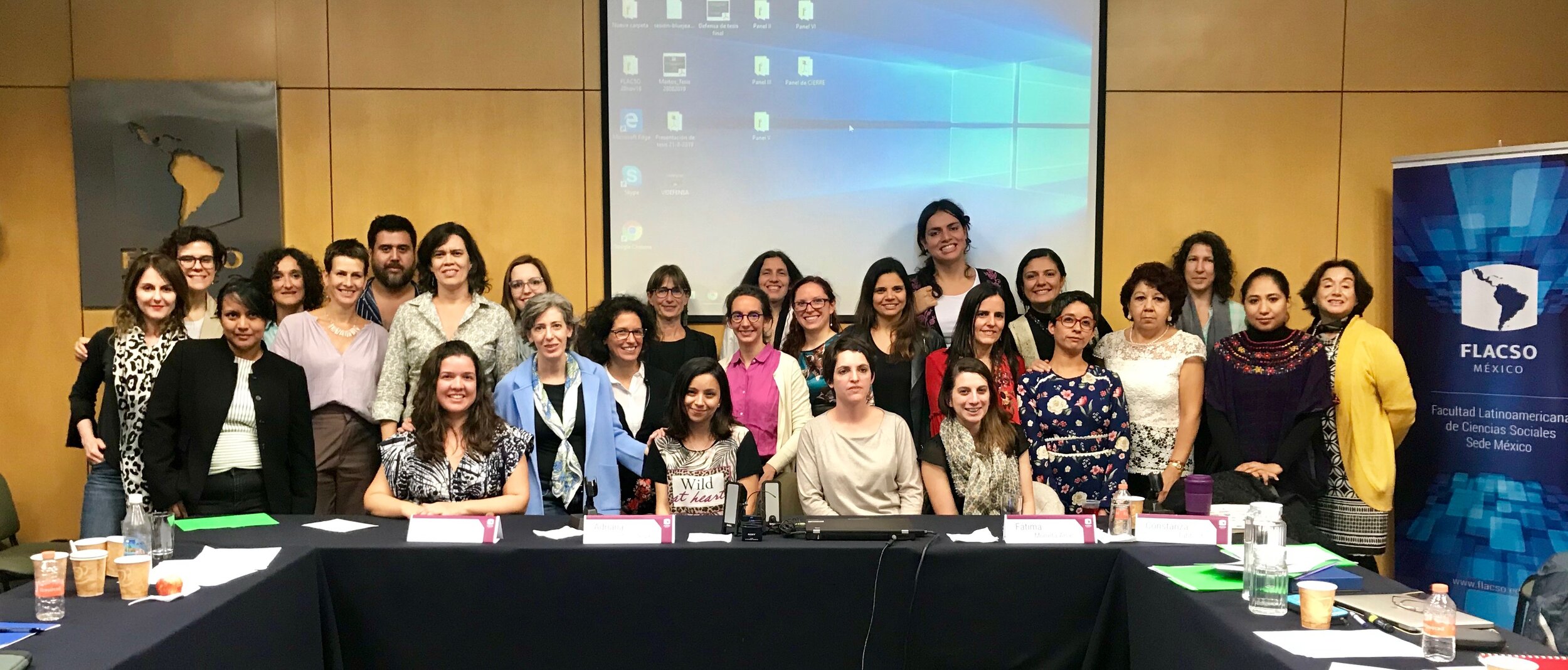
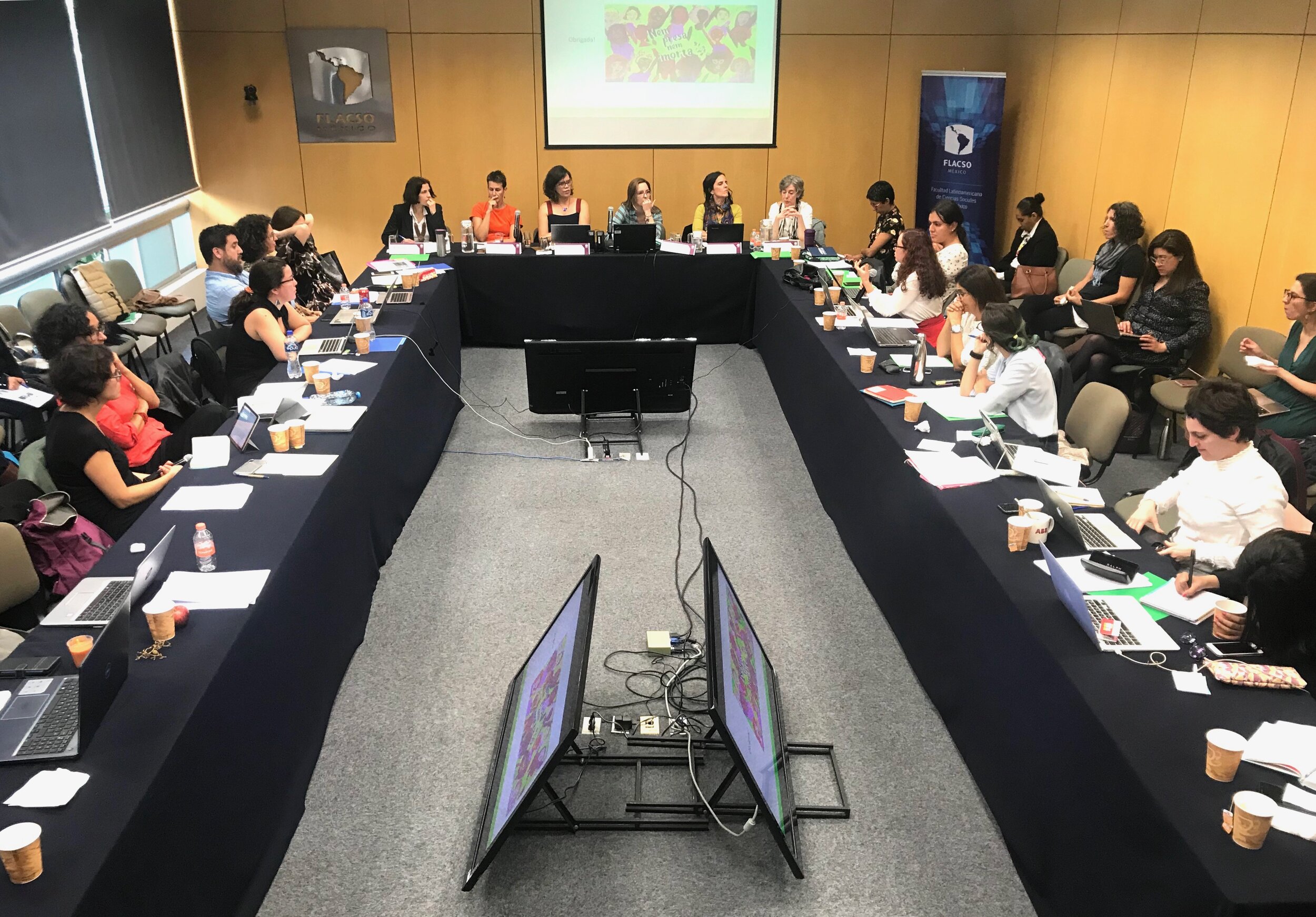
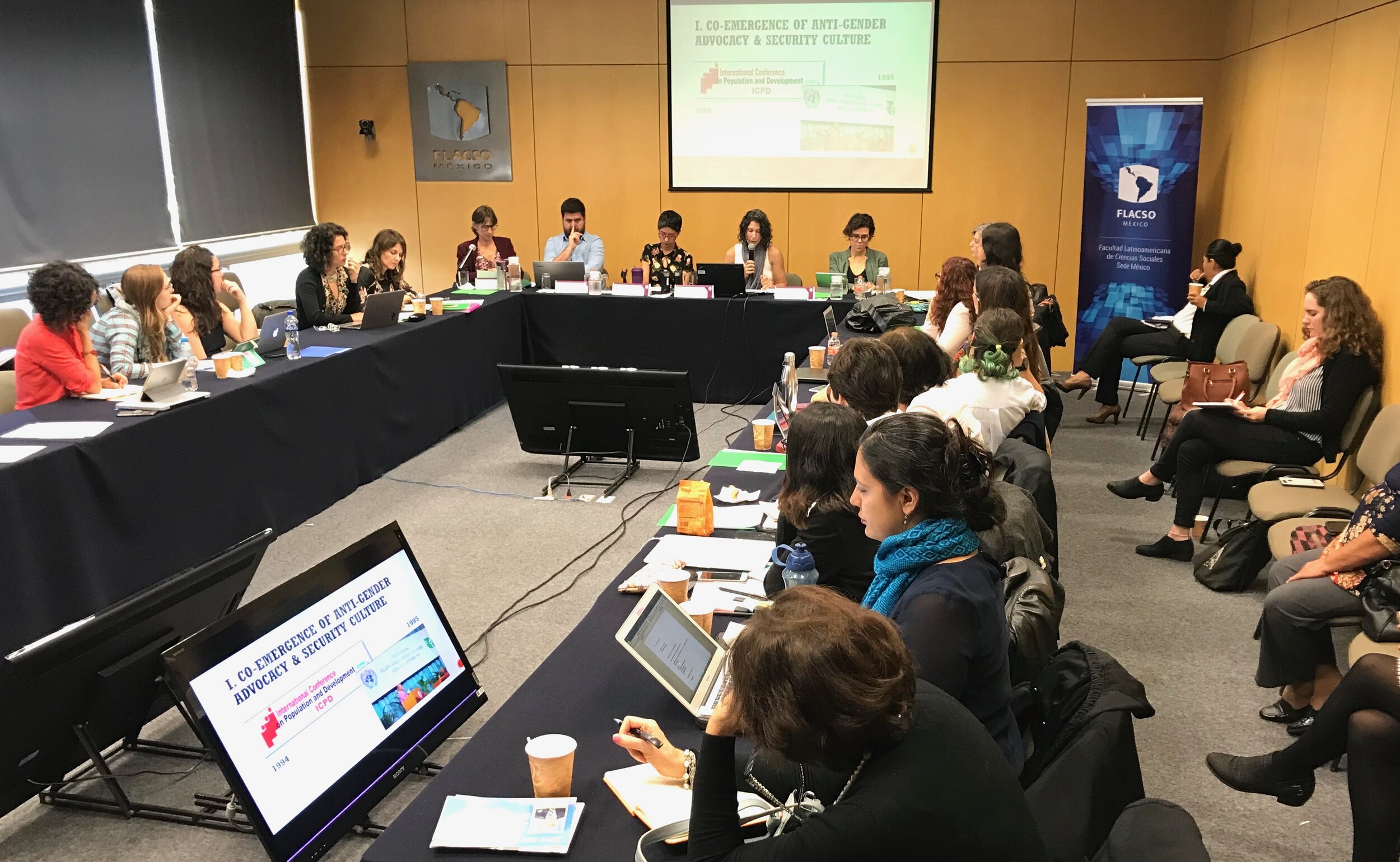
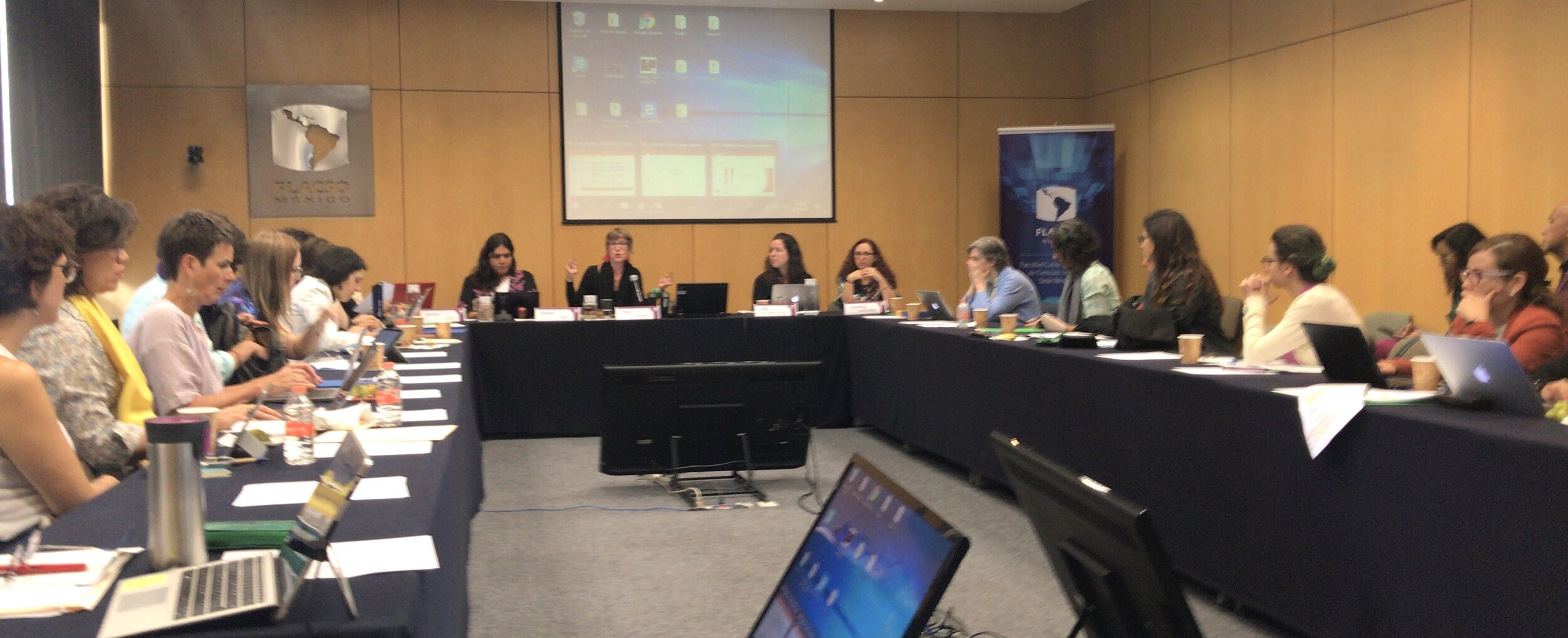
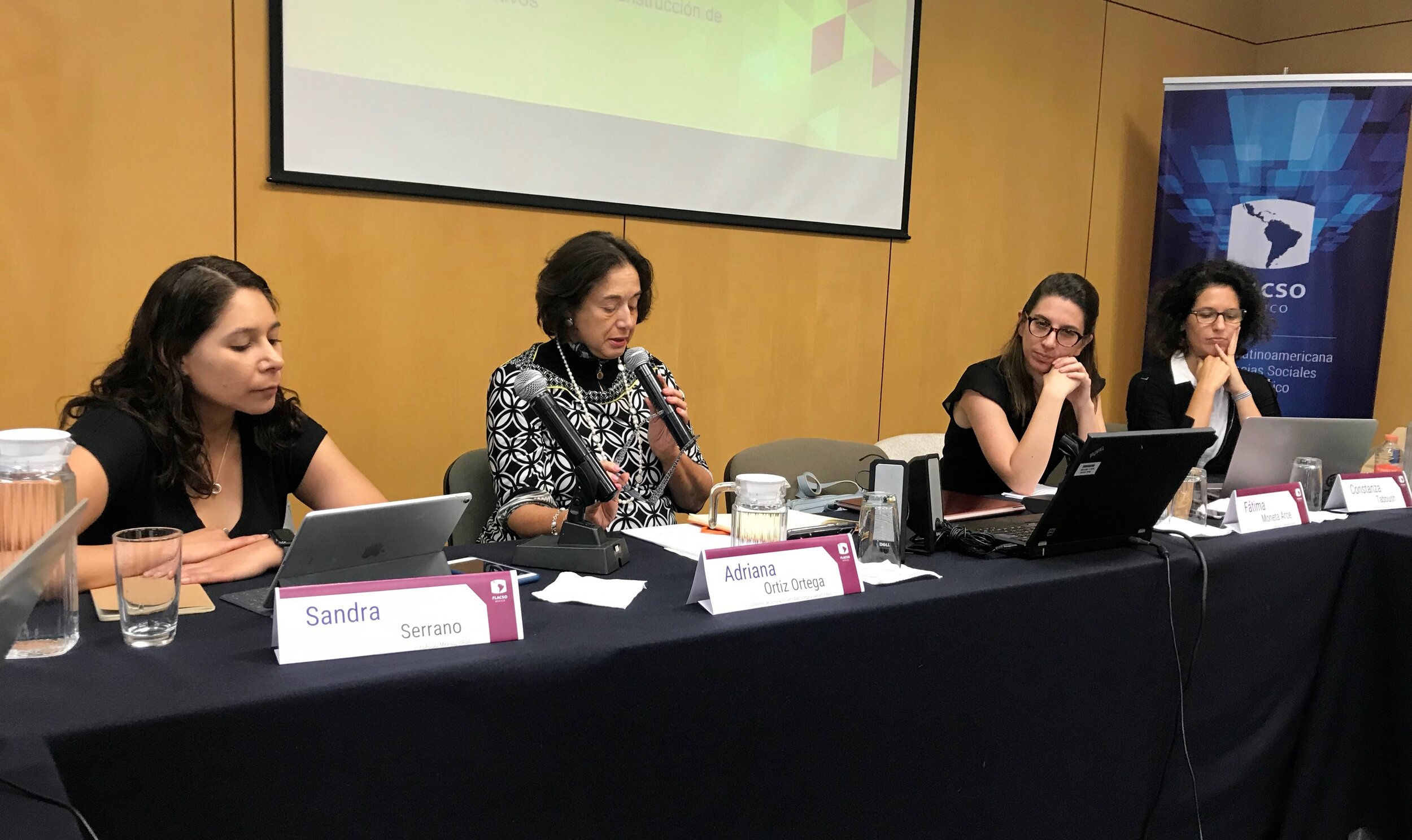
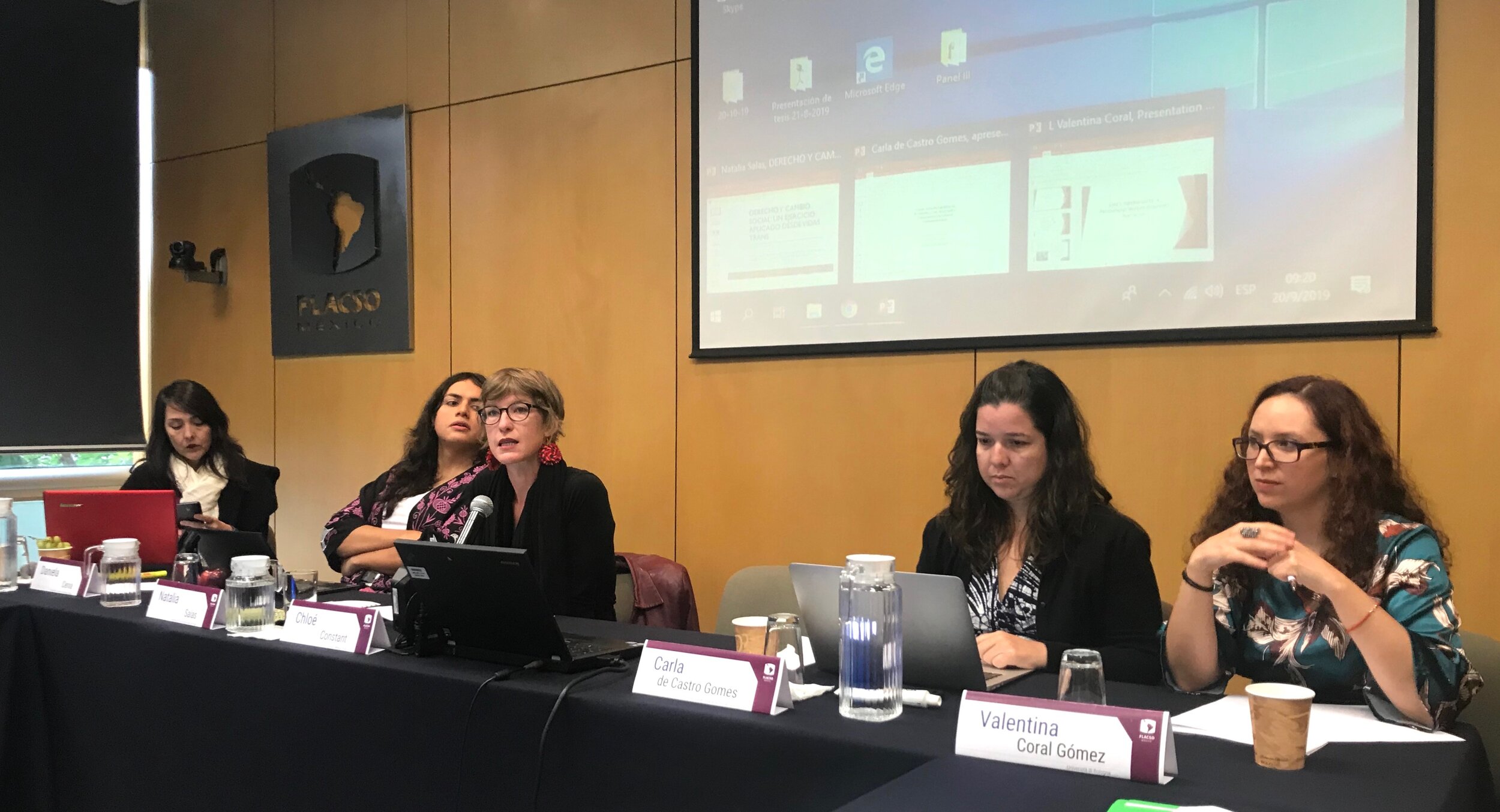

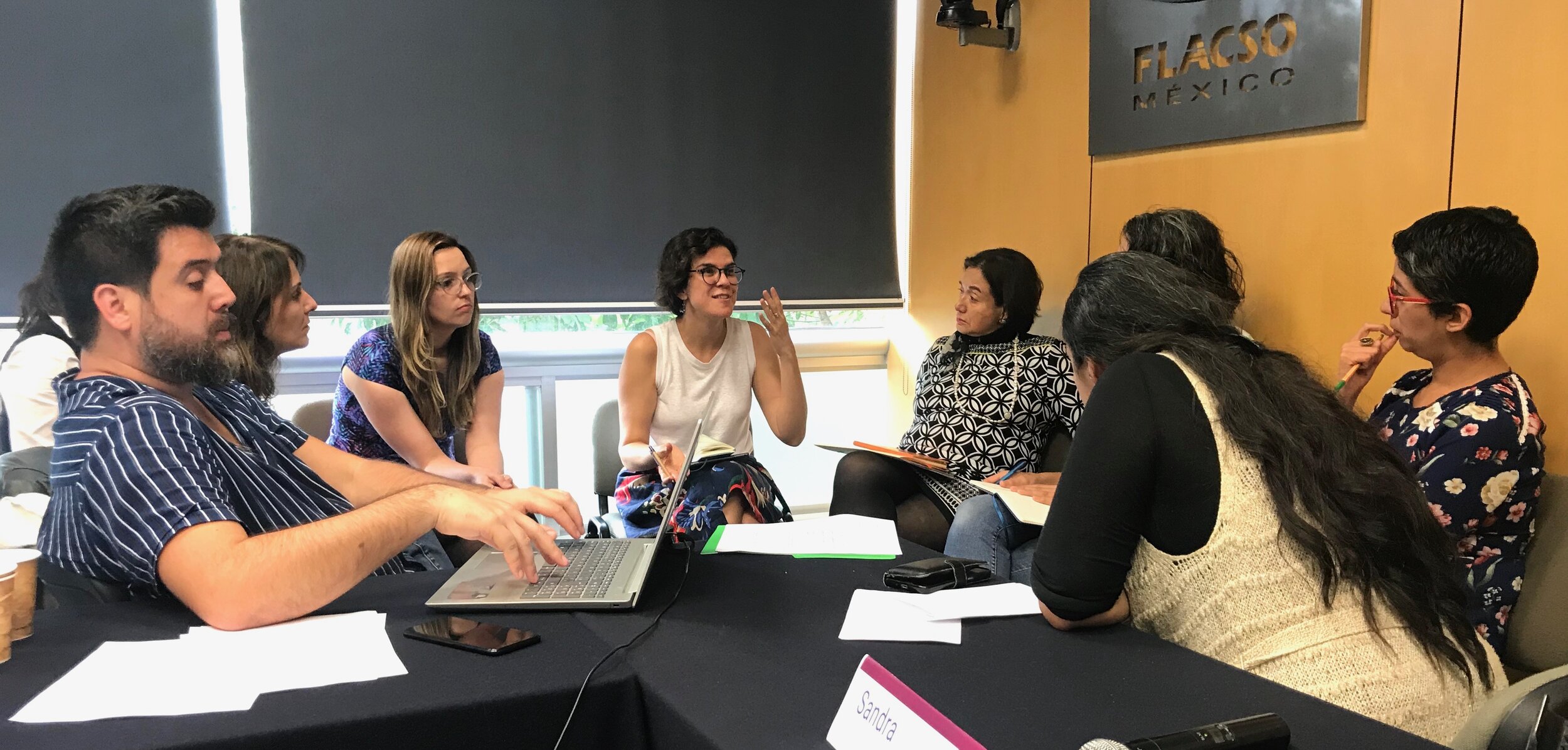
Theme Call for Papers:
The focus on feminisms and conservativism is rooted in the observation of various phenomena that constitute particular challenges to feminist movements in the region and also in countries of Global South. In the past decade, events have occurred that were not foreseen by recent studies related to the advancement of a gender and sexual justice agenda in Latin America. On one hand, there are a greater number and cumulative spread of protests to uphold feminist demands, including the human rights of women and LGBT collectives.
On the other hand, and simultaneously, the presence of counter-movements rooted in religious groups has increased, both on a local level and within national institutions of representative government (Executive, Legislative and Judicial). These religious groups include both those connected to the Catholic church, as well as, more recently and with increasing intensity, evangelical groups belonging to various denominations.
Within this context, we seek to address the following central questions:
What is the relationship between new and old forms of institutional activism regarding movements supporting the feminist and LGBT agenda and counter-movements that oppose this?
Which movement and counter-movement networks of institutional activists are maintained in institutional spaces and which not?
How do the contexts of economic crisis, depletion of development models and growing criminal violence ideologies impact the growth of counter-move-ments and conservative and religious ideologies of a “family” perspective?
What are the political lessons for progressive feminist politics in this new and challenging international political context?
What are the diffusion and learning processes that could feed into the work feminists are doing in other regions or in international political spaces?
The International Feminist Journal of Politics announces the second IFJP Conference of 2019:
Gender Violence and Feminist Resistance in Latin America
OCTOBER 17-19, 2019
Pontifical Catholic University of São Paulo, SÃO PAULO, BRAZIL
PROGRAM
Conference Website
CHECK OUT WHAT WAS SAID ON TWITTER AT #IFJP2019
We are delighted to announce that the Pontifical Catholic University of São Paulo (PUC-SP, Brazil) will host the second 2019 IFJP Polycentric Conference on the theme “Gender Violence and Feminist Resistance in Latin America,” October 17-19 in São Paulo, Brazil. The conference will address issues concerning the rearticulation of forms of violence against women and other feminized bodies in contemporary Latin America. This opportunity follows the traditional IFJP conference format, with an open call for papers, panels, roundtables, and a special opportunity for mentoring and networking, but - with three languages.
Gender violence in the region has been on the rise despite the advance of legal protections. These dynamics have spurred important regional articulations, such as the Argentinian collective Ni Una Menos (Not One Less), which rose historically against femicide and male violence in the country and has been a source of inspiration for building a transnational and intersectional feminist agenda. In its wake, feminist articulations in the region have been offering the opportunity to create solidarity across multiple issues and movements that are trying to resist the growing wave of political conservatism – including syndicates, leftist parties, the landless workers’ movement (MST, in Brazil), indigenous collectives, and soccer associations, among others.
In this light, the conference aims to foster a productive reflection on how the increasing number of deaths of feminized bodies in the region has been triggering the articulation of a broad feminist resistance, and what Latin American feminists – activists and scholars alike – have to say about the power of feminism to resist institutionalized gender violence and reconstruct the political sphere.
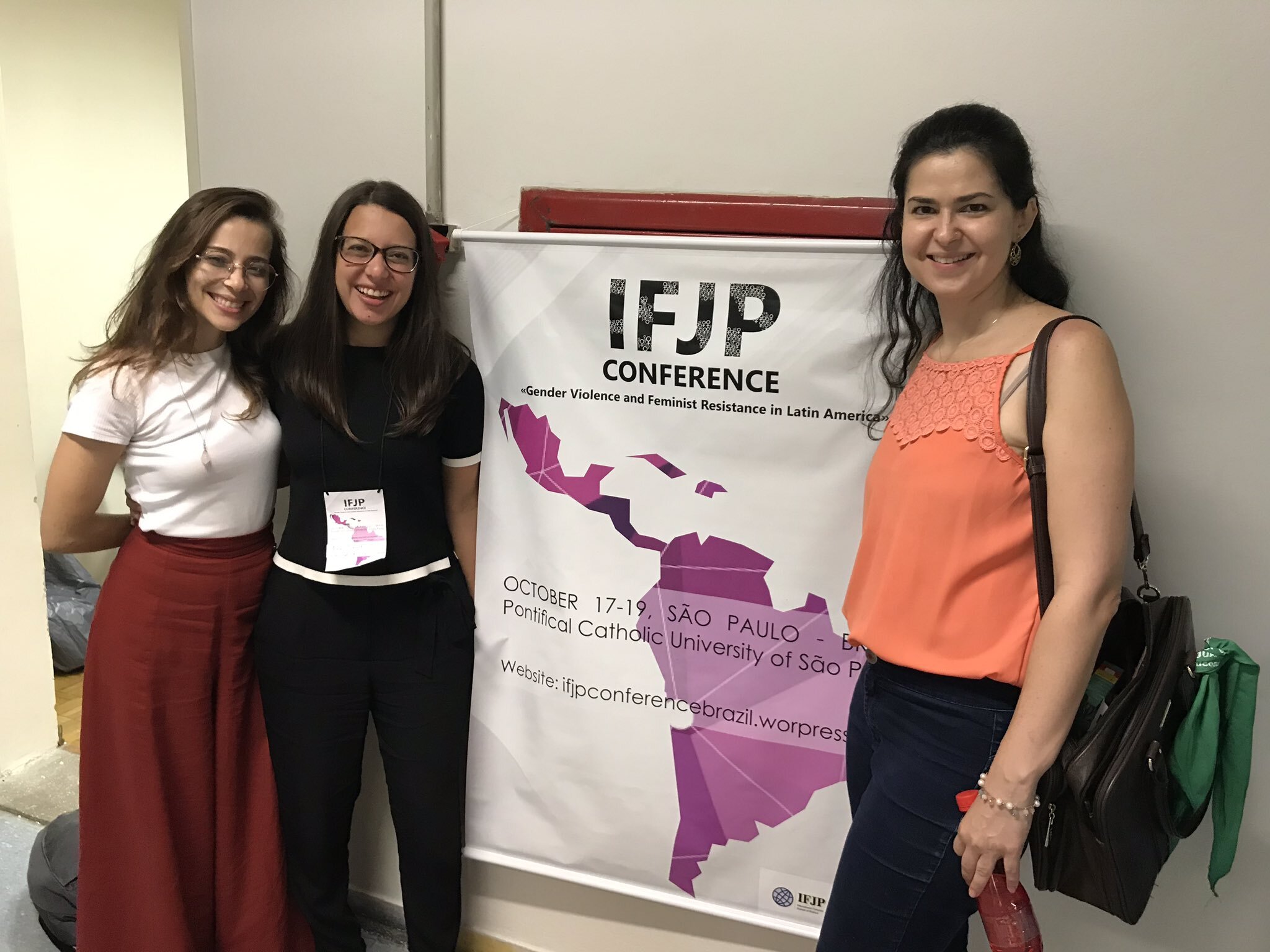
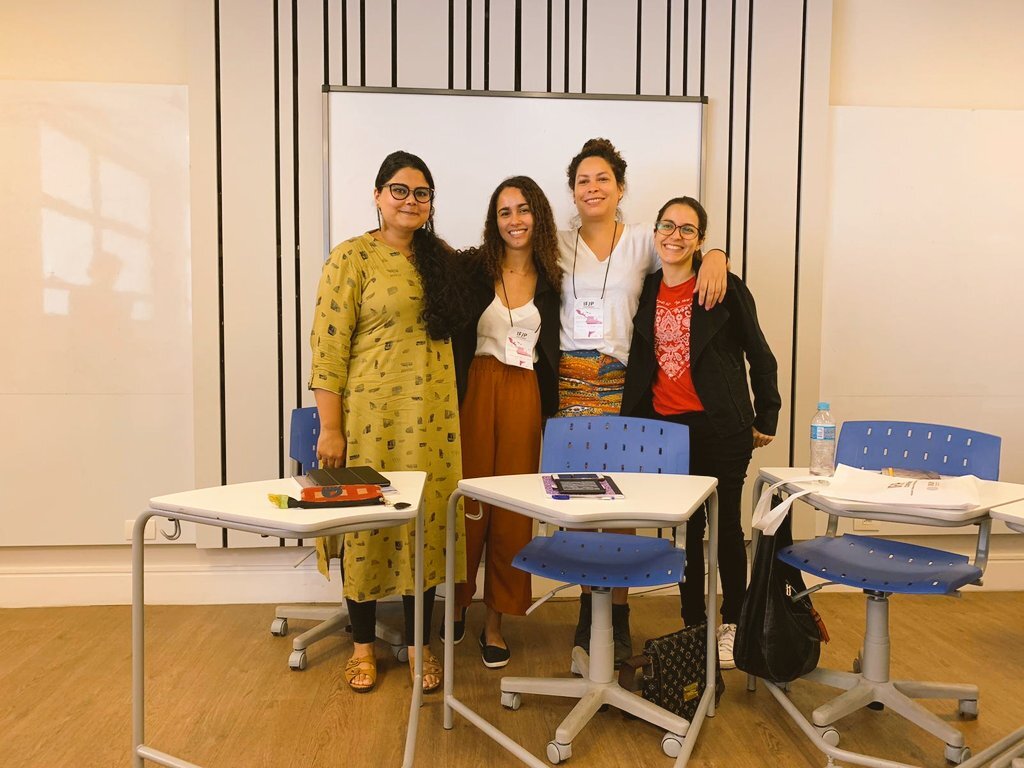
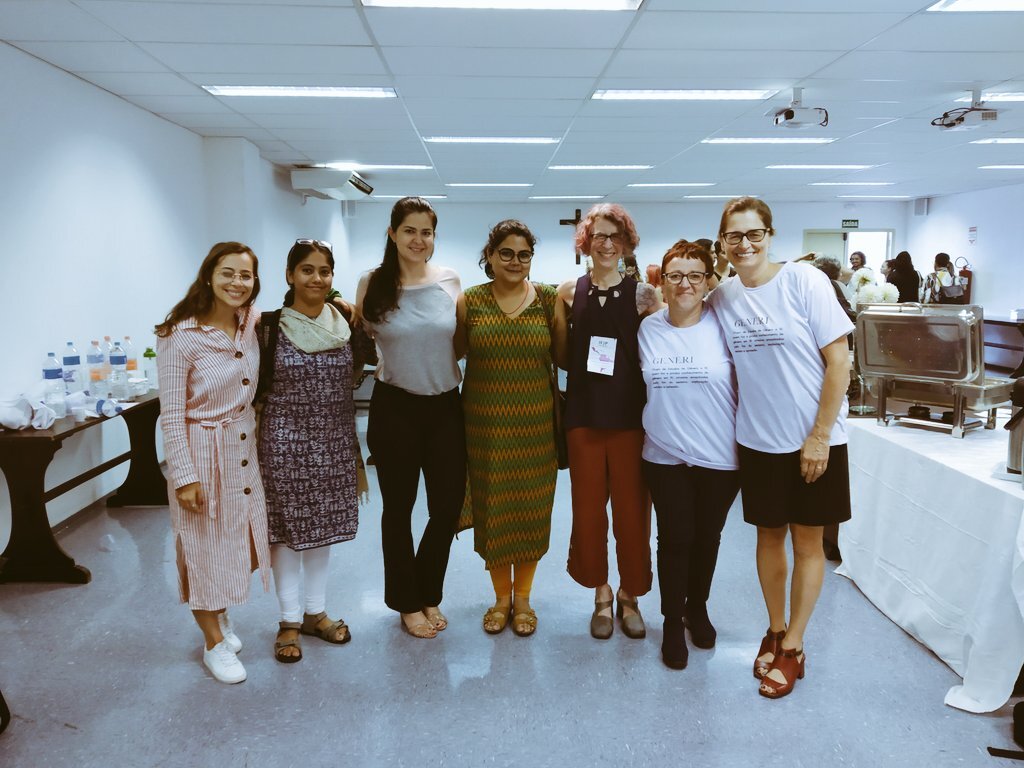
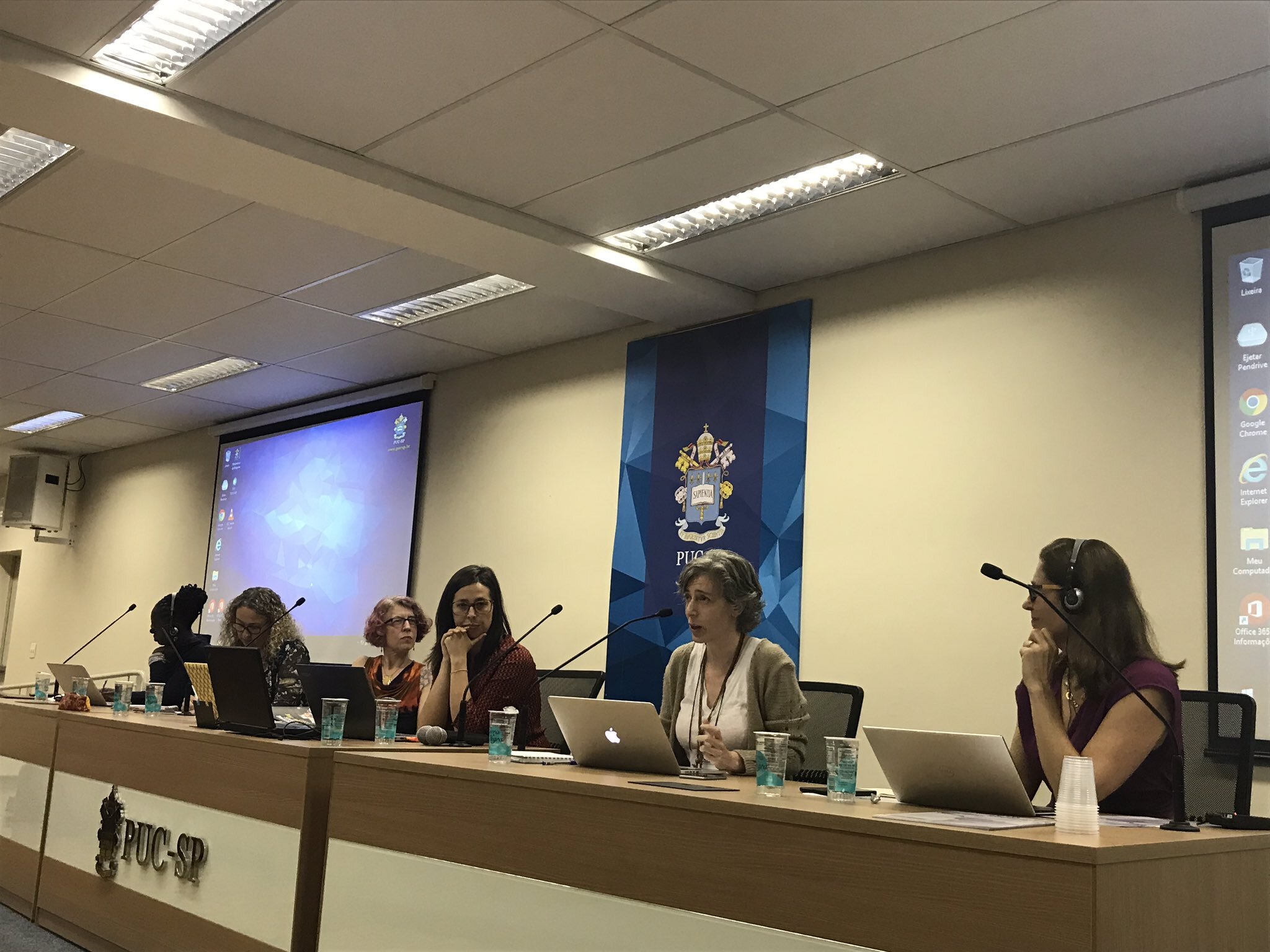
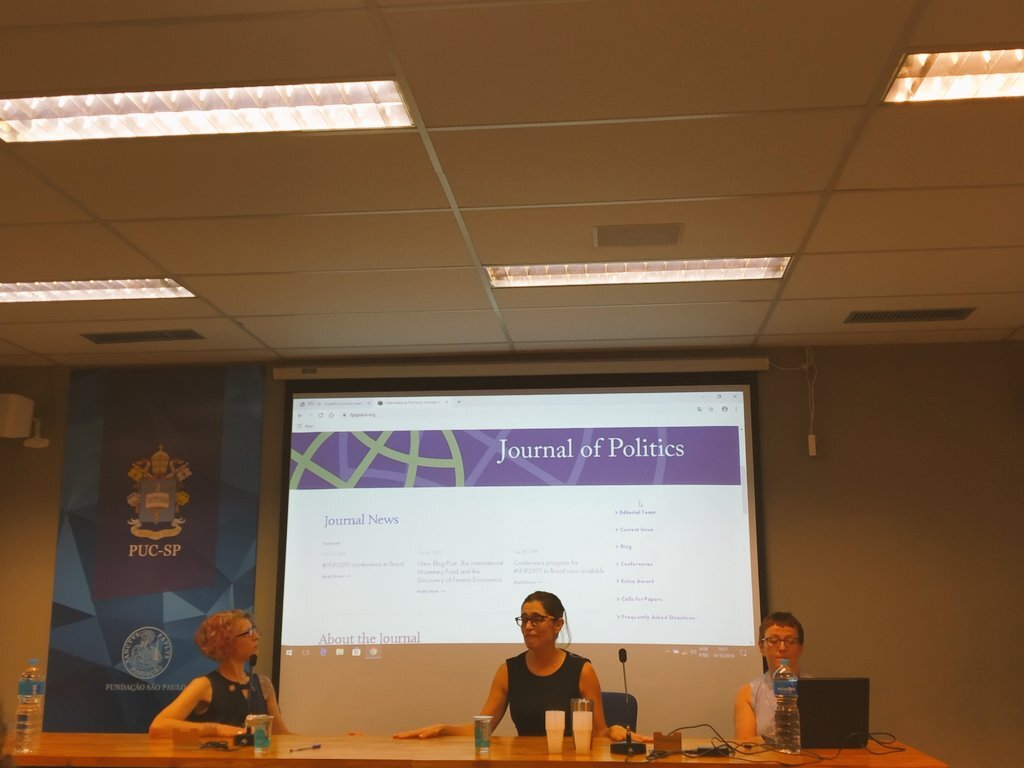
Theme Call for Papers
Contemporary feminist mobilizations in Latin America have come to occupy the forefront of a regional and international rearticulation of political resistance that has been defying generalized waves of conservatism taking over traditional politics in most of the world. The past years’ impressive articulation of an International Women’s Strike on 8 March calls attention to the transnational and popular character of these contemporary feminist movements, which have been able to produce solidarity across agendas and regions, being characterized as a “feminism of the 99%”.
What is particularly striking when we look at the relationship between gender violence and feminist resistance in the region is the apparent contradiction between the advancement of legislation to protect women and the growth of gender violence rates. In this context, feminist movements have been rearticulating political solidarities beyond the identity politics of “women,” historically considered as a minority position, opening instead avenues for bringing together movements and collectives not traditionally aligned with a feminist politics, such as syndicates, leftist parties, the landless workers’ movement (MST, in Brazil), indigenous collectives, and soccer associations, among others. These developments introduce new nuances in the political practices in the region. Increasingly, feminists are seen not only as identity groups representing a minority position within a larger and more important movement against capitalism and political and social oppression, but as occupying the forefront of the political arena — thus inviting renewed waves of anger and sympathy.
Latin America has thus become an important site to look for the way new forms of violence are victimizing women and feminized bodies in general, in spite of the advancement of legal protection against gender violence. At the same time, movements articulated in the region have been offering much needed inspiration to the advancement of a transnational feminist agenda which has been turning difference into a source of strength rather than weakness, being able to produce solidarity across multiple agendas.
In order to reflect on these dynamics, the 2019 IFJP Polycentric Conference at PUC-SP invites submissions that address the following questions:
How does gender relate to the broad spectrum of violence afflicting Latin America?
What are particular forms of gender violence in the region and how do feminist articulations – networks, organizations, collectives, movements – resist them?
What is the relationship between the affirmation of specific masculinities and the broad spectrum of gender violence in the region?
How do colonialism and the coloniality of power continue to have an impact on gender relations and gender violence in the region?
How to address the dialogues and tensions between feminism(s) and the indigenous women’s and/or feminist movements in Latin America?
What are the contemporary forms feminism has taken in Latin America and how do they affect the constitution of a democratic ethos in the region?
How do feminist movements in the region respond – or fail to respond – to the necropolitics involving transsexual bodies?
What is the transnational reach and impact of feminist articulations spreading from Latin America?
What are the impacts of intersectional issues in Latin America on the recent rise of feminist movements in the region?
What are the new solidarities, networks and attachments being produced by feminists in the global South and throughout the world?
What is the role of bodies, emotions and affects in restructuring feminist solidarities?
What roles might feminist scholarship have in addressing these contemporary developments in feminist articulations?
The IFJP 2019 Polycentric Conference at PUC-SP, Brazil, was held in all three languages of the region (Portuguese, Spanish and English). Translation services will be provided for the Roundtables, but Panel sessions should be formatted in either one of the three languages. In light of that, we will offer free registration to those willing to serve as interpreters.
2018 Conference
The 7th annual International Feminist Journal of Politics conference - “Feminism + Knowledge + Politics” -
was held at the University of San Francisco on April 2 and 3, 2018
View the Program here
Check out what was Said on Twitter at #IFJP2018
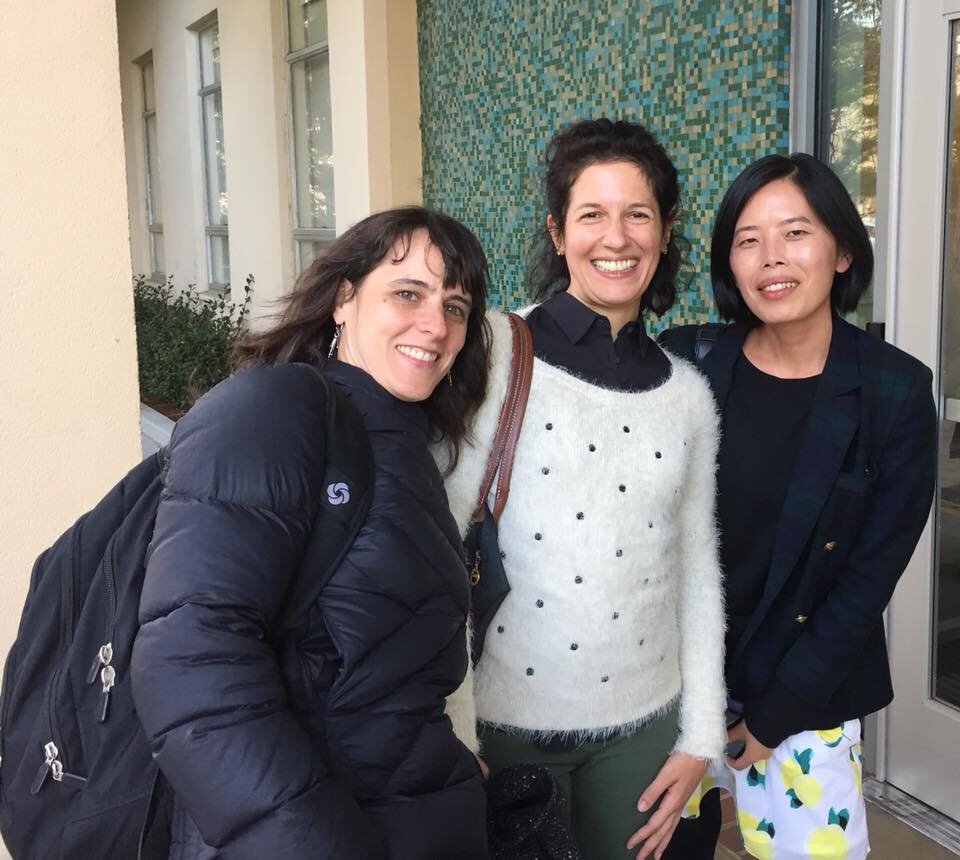
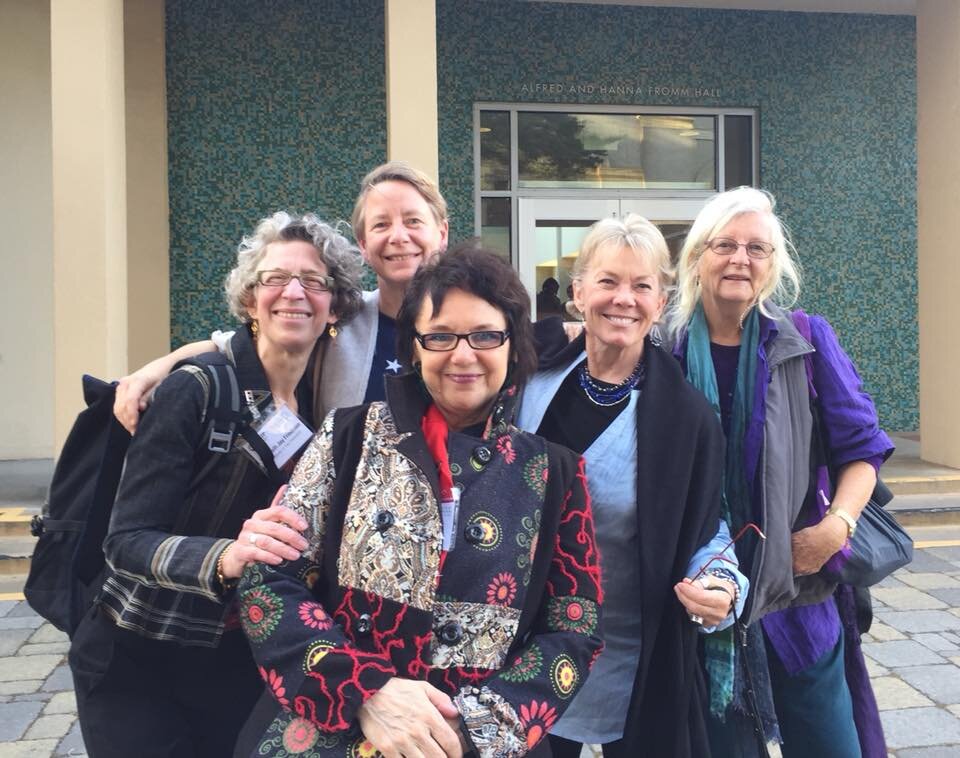
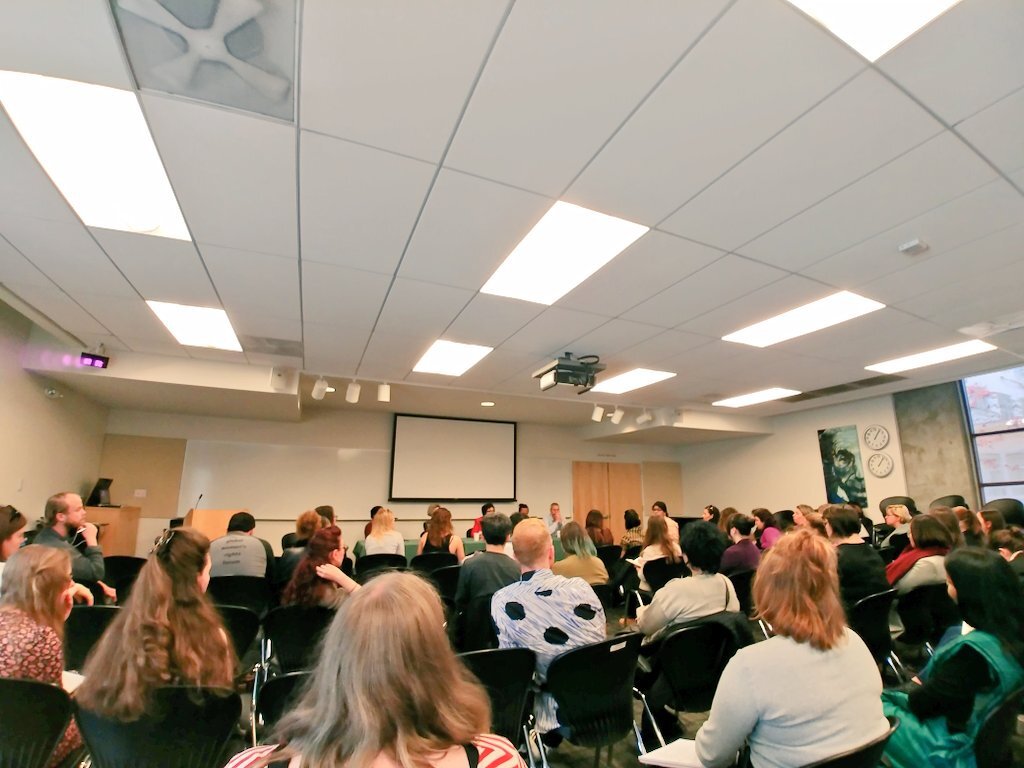
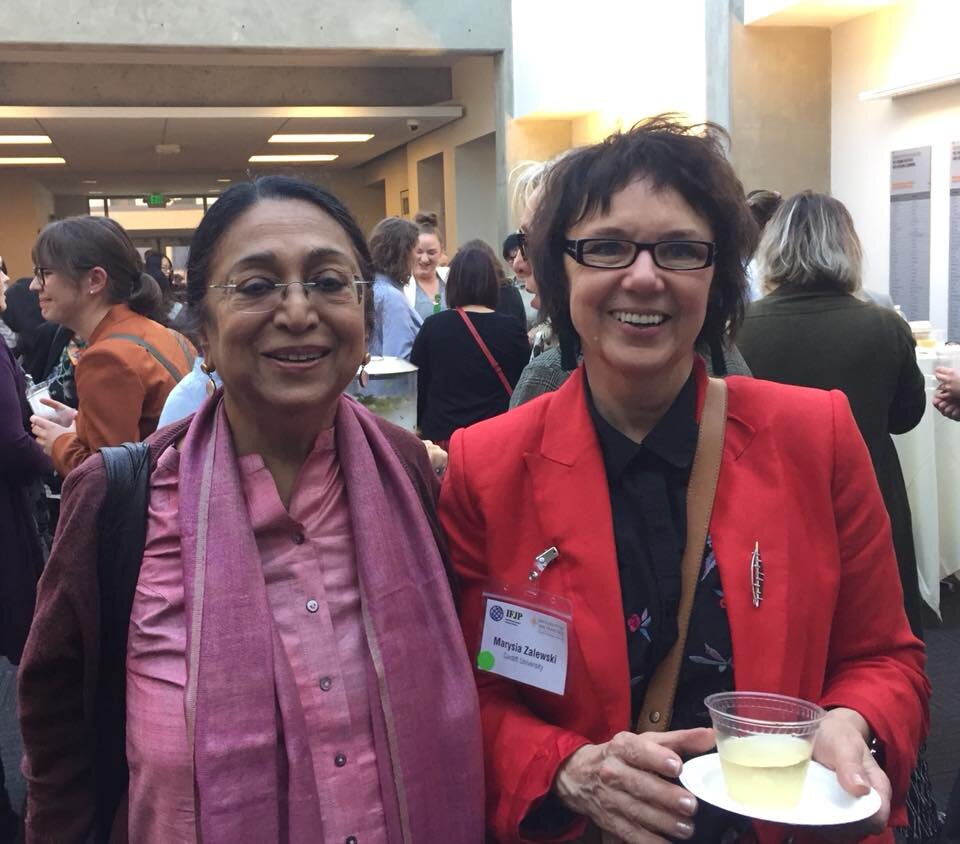
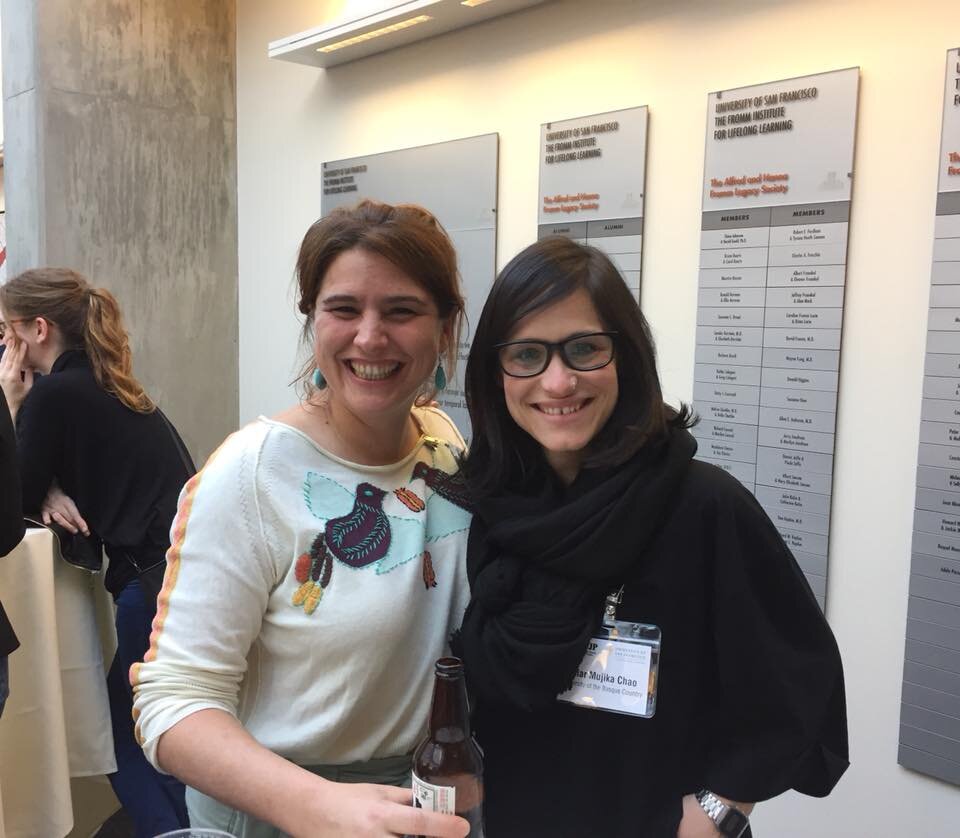
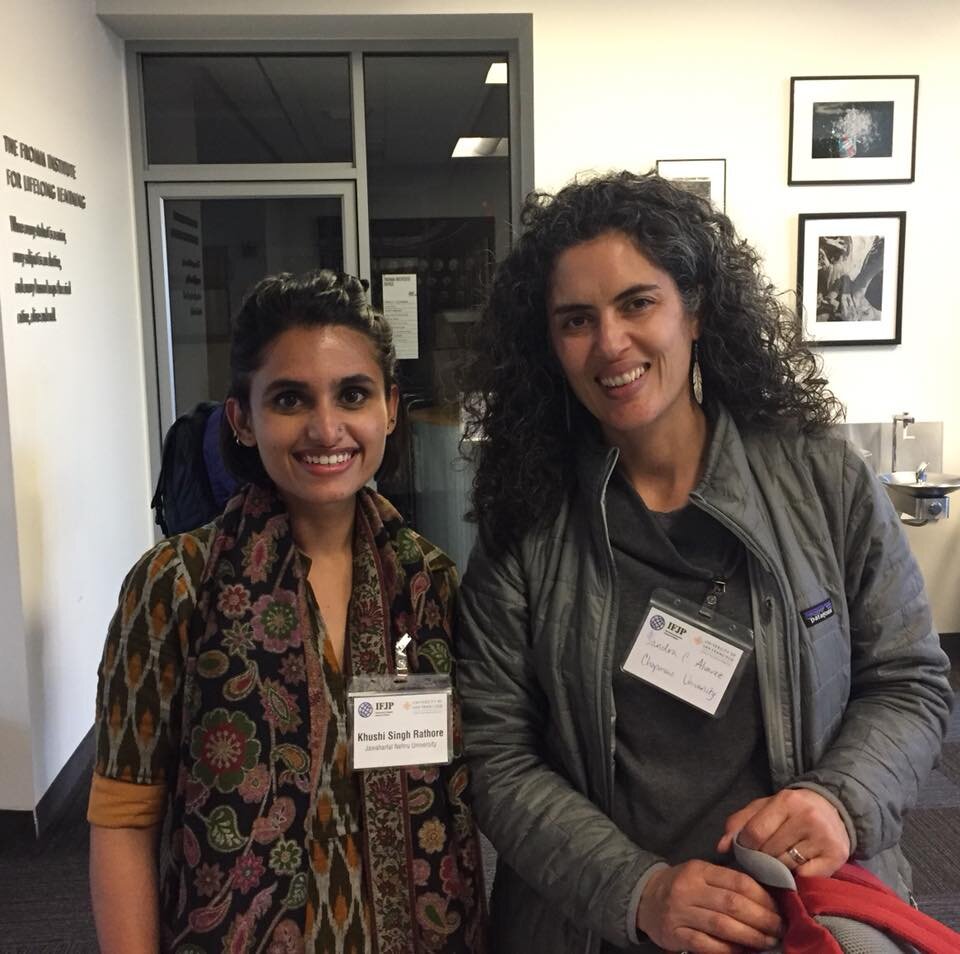
Some of the participants (including current and former editors) at the #IFJP2018 conference in San Francisco.
2017 Conference
The International Feminist Journal of Politics announces the 6th Annual IFJP Conference
Walking the Talk: Feminist Reflections on International Practices
April 10-11, 2017
Pre-conference Workshop: April 9, 2017
South Asian University, New Delhi, India
Venue: India International Centre, Max Mueller Marg, New Delhi (TBC)
VIEW THE PROGRAM HERE
Theme Call for Papers:
Feminist International Relations (IR) scholarship has persuasively represented global politics as a masculinist domain. The dominance of hegemonic masculinities over femininities and subordinate masculinities is evident across a broad spectrum of international practices, from treaty negotiations to the work of ‘progressive’ civil society groups that may well be complicit in the reproduction of gendered hierarchies in their everyday work. Even as gender issues gain recognition in the political arena and more women join public deliberations, the conduct of international relations continues to be defined by such powerful binaries. Stereotypical assumptions about race, sexuality and economic privilege – and relations of power therein – further ascribe the dominant ways of ‘doing’ global politics.
The conference organizers invite feminist reflections on diverse international practices such as diplomacy and statecraft, bureaucratic politics, activism and advocacy, and indeed research and other forms of knowledge production. We encourage submissions that seek not only to build on existing (re)formulations of international relations, but also to identify and propose specific feminist ethics, strategies and methods in/for the everyday conduct of international practices.
Potential contributors may wish to consider the following questions:
What makes an international practice, organization or institution feminist?
What difference do ‘diverse’ bodies, including those of women, make to international practices?
Are particular ‘levels of analysis’ or spheres of activity better suited to feminist practices?
What are the ethical anchors for feminist practices?
What is the significance of concepts such as accountability, democracy, empathy, solidarity and transparency in feminist practices?
What is the role of culture, broadly understood, in defining, understanding and advocating for feminist practices?
In light of the employment of ‘strategic essentialisms’ in advocacy and policy making, to what extent do ends justify means?
What is the scope of resistance and resilience in contemporary international practices? How are these gendered?
How do neoliberal logic and funding imperatives factor into gender-related work?
In what ways does attention to practices challenge existing feminist IR theories and methodologies?
Papers and panel proposals focusing on practices of specific international (or regional) organizations such as the United Nations are also welcome.
Check out what was Said on Twitter at #IFJP2017
Voices from Kashmir
April 10th, 6:00pm
Indian Social Institute
This is an independent event hosted by the Journal
Panel 1: Narratives of Insecurity in Kashmir: Gendered Bodies, Gendered Practices
Chair: Emma Brännlund, University of the West of England, Bristol
Interrupted Life: The Mother of the Disappeared, Shubranshu Mishra, Brussels School of International Studies, University of Kent, Brussels
The Politics of Memorialisation in the Anti-Disappearance Movement in Kashmir, Niharika Pandit, Centre for Gender Studies at SOAS, University of London
Masculinity, Violence, and the Politics of Surrender: Listening to Testimonies of Male Activists and Former Militants in Kashmir, Akanksha Mehta, Centre for Gender Studies at SOAS, University of London/University of Sussex
Panel 2: Conflict and Resistance in Kashmir: Gender as a Site of Protest
Chair: Swati Parashar, University of Gothenburg, Sweden
Gender and Resistance in India: A Case History of Kashmir Conflict, Mushtaq Ul Haq Ahmad Sikander, independent researcher
The Relational Indian State; Women in Kashmir’s Resistance, Inshah Malik, independent researcher
Gender and Protest: An Analysis of the Kashmiri Unrest of Summer 2016, Seema Kazi, Centre for Women's Development Studies, New Delhi
Feminist Disjunctions: Women’s Activism without Feminism, Emma Brännlund, University of the West of England, Bristol
2016 Conference
The International Feminist Journal of Politics announces the 5th Annual IFJP Conference
Decolonizing Knowledges in Feminist World Politics
May 20-21, 2016
University of Cincinnati, Cincinnati, Ohio, USA
VIEW THE PROGRAM HERE
Pre-Conference Workshop
Conference Abstracts
Theme call for papers:
Decolonial feminist thought and praxis seek a de-centering of the West, including its epistemes, institutions, politics, and Westphalian world order, through centering the histories, lands, livelihoods, bodies, thoughts, emotions, and spiritualities of indigenous peoples colonized by white settler states past and present (Simpson 2015) as well as by Western gendered, racialized and heteronormative orders and the “neoliberal imperium.” (Agathangelou and Ling 2009). Latin American decolonial scholars have posited the “coloniality of power” and “gender” (Quijano 2000; Lugones 2010) in which the Eurocentric/non-Eurocentric divide under now global colonial capitalism structures all social, economic, and political relations into relations of domination and constructs the current gender system. Decolonial work in International Relations (IR) has ranged from reconfiguring IR’s origin stories in relation to the history of colonialism (Tickner 2014) and de-centering Eurocentric accounts of state security (Laffey and Weldes 2008) to more feminist- and queer-informed foci on indigeneities, the stateless, and groups, including nations, below and across states, with particular emphasis on decolonizing bodies, identities, and desires (Nayak and Selbin 2010). Recognizing that white Western women have tended to be the beneficiaries of the coloniality of power, knowledge, and gender and that, as a result, white Western representations of feminism, feminist IR, and transnational feminism require decolonization, IFJP seeks submissions for this special issue, which arises from the Fifth Annual IFJP Conference held at the University of Cincinnati in May 2016 on its theme, that address decolonizing feminist world politics knowledges through any aspect(s) of the following questions:
What constitutes decolonial feminisms? How are they imagined in different parts of the world?
What constitutes decolonizing methodologies in feminist world politics and/or transnational feminist inquiry today?
How do decolonizing projects de-center the state and the human in the Western liberal imaginary and with what implications for IR and feminist IR?
How are decolonizing projects related to the de-centering of hegemonic masculinities, heteronormativities, homonormativities, and gender normativities? What does it mean to decolonize these de-centering projects?
How are decolonial, postcolonial, and anti-racist projects (inter)related?
What does it mean to decolonize feminist security studies?
What does it mean to decolonize feminist global political economy inquiry?
What does feminist decolonial inquiry mean for transforming world politics?
What are decolonial challenges in transnational feminist inquiry?
How are bodies, emotions, and minds as well as geographies, institutions, and structures colonized and decolonized?
What are promising decolonizing movements and practices in various parts of the world?
What are the implications of decolonizing projects for what lives (human and non-human) matter?
Check out what was Said on Twitter at #IFJP2016
Conference Keynote:
Zillah Eisenstein, "BEING PRESENT 2016: Finding New Feminisms Against Empire"
Opening Presentation:
Breny Mendoza,"Decolonial Feminism and the Question of the Decoloniality of Democracy”
2015 Conference
The International Feminist Journal of Politics announces the 4th Annual IFJP Conference
The Difference that Gender Makes to International Peace and Security
June 18-19, 2015
The University of Queensland, Brisbane, Australia
VIEW THE PROGRAM HERE
Pre-conference Workshop
Theme of Conference:
In 2015 it will be twenty years since delegate countries signed the 1995 Beijing Declaration and Platform for Action; fifteen years since the United Nations Security Council passed Resolution 1325 (2000) on Women, Peace and Security; and 2015 itself, will be a year of intense consultation and negotiation with the looming end of the Millennium Development Goals. A stated ambition of the High Level Panel of Beyond 2015 is to directly address the chronic failure in the past to prioritise gender inequality in all development and human rights projects. Gender inequality, namely the social, economic and political rights of women and men secured irrespective of sex or gender, has not yet been understood as both a universal good and one that must be mainstreamed across development, human rights and preventative diplomacy sectors.
Accordingly, the concern in 2015 is not remarkably different from the concern in 1995 – societal and state tolerance of gender inequality directly contributes to the ongoing discrimination and oppression of, namely, women. The intensity of discrimination against women will differ according to location, immigrant-status, sexuality, income, employment, disability, religious, economic, education and race/ethnic disparities; but it is present everywhere. When gender inequality is normalised, women face heightened risk of being politically and socially excluded; and being targeted for public and private acts of physical violence, particularly in situations where there is civil unrest and conflict.
There is increasing interest in understanding the correlation between high rates of gender inequality and the onset of conflict; likewise it is increasingly suspected that situations of extreme gender inequality may be an enabling precondition in situations of mass atrocities, which includes widespread and systematic sexual and gender based violence. In post-conflict scenarios, gender inequality - when unaddressed - further risks alienation of women from peacebuilding processes, security sector reform and post conflict development programs. This in turn affects the necessities to achieve peace – refugee return, land distribution, disarmament and demobilisation, labour and reconciliation – all of which contributes to the cycle of post-conflict violence and heightens the risk of a return to one-sided/state-level violence.
Over the last twenty years understanding the effects of gender inequality on international peace and security has led to much study and data collection. This feminist-informed scholarship has deepened collective understanding of the preconditions for lasting peace and security. However, the impact that efforts to reduce gender inequality have had on sustaining peace and security has received less feminist scholarly attention. The argument that gender equality is not an optional extra but essential for the maintenance of international peace and security still needs to be made. This conference will bring feminist scholars of international relations together from across global regions. Papers directed at the conference theme will help to achieve this essential contribution.
It is in this spirit that the 2015 IFjP Conference theme will be devoted to the positive impact of gender equality on international peace and security - from the relationship to conflict prevention, the prevention of mass atrocities and conflict transformation, to the realisation of economic, social and political human rights. We seek to include papers that have a diverse representation of regional case studies (Africa, Americas, Asia, Europe, Middle East and Pacific). This will enable the theme papers at the Conference to be a novel source of regional comparative analysis of the positive impact of addressing gender inequality and injustice.
The purpose of this theme is to build data and cases that explore the positive impact of gender equality on international peace and security. We hope that participants will consider how their work applies to the theme, and enter the theme discussion. However, the conference will (of course) include papers that explore failed attempts to address gender inequality, or that speak to the remit of the journal and not necessarily the theme.
Check out what was Said on Twitter at #IFJP2015
2014 Conference
The International Feminist Journal of Politics announces the 3rd Annual IFJP Conference
Gender and Crises in Global Politics
May 9-11, 2014
University of Southern California, Los Angeles, California, USA
VIEW THE PROGRAM HERE
Theme Call for Papers:
If one is to believe what newspapers, news media, and even IR’s journals suggest, the global political arena is (again) in a time of crisis. The Global Financial Crisis still reverberates and is producing the Debt Crisis. The continued violence in Syria, the tensions between Israel and Palestine, the aggression of the Democratic People’s Republic of Korea, the risk of Iran’s proliferation and other militarily volatile situation have been characterized as crises. Environmentalists warn of ecological crisis, health scholars warn of a disease crisis, cyber-security specialists suggest a coming information crisis, and migration experts warn of population crises. On the other hand, a range of issues are excluded from the categories of crisis. Why, for example, is rape in the Democratic Republic of the Congo not a crisis? Taken together, these present-day presumed crises and non-crises sit beside a history of global politics that is often told as a connection of crises – wars, depressions, diseases, and natural disasters.
Feminist work in International Relations has addressed many of these crises, both historical and contemporary, yet there is more to be done. The thematic focus of this year’s conference is on feminist theorizing of crisis, as well as of crises. We hope papers will address some of the following questions, both theoretically and empirically:
How does an event or social situation come to be constituted and represented as a crisis? What do gender and/or queer lenses tell us about what we recognize as crisis and how we read those crises?
Whose suffering constitutes a crisis, and what reactions are warranted? How does crisis policy behavior allow for the omission of concerns and needs of people at the margins of global politics? What do feminist and/or queer approaches to the politics of crisis representation look like?
Who/what is the subject of crisis politics? In crises, who is protected, saved, or forgotten? Whose crises demand attention? Whose are ignored?
What do gender and/or queer lenses tell us about analyzing crisis in global politics? What unique methods do feminisms bring to identifying and understanding what constitutes crises?
Are there feminist and/or queer approaches to crisis management? What challenges do crises present differently from ‘everyday politics’ as traditionally understood? What might a gendered/queer analysis of ‘means and ends’ tell us about crisis? Do gender and/or queer lenses tell us something about crisis strategy generally and/or disaggregate their analyses by types of crises?
How does feminist and/or queer theorizing deal with characterizations of 'times of crisis’? Does feminist and queer work in history, sociology, geography, and politics provide contextualization of such characterizations?
What if anything does it do to look at theorizing crisis as in crisis? How do gender/queer lenses think about crises in theorizing – of crisis itself and of specific concepts in crisis located in political economy to security?
Conference Keynote:
J. Ann Tickner "Revisiting IR in a Time of Emergencies: Learning from Indigenous Knowledge"
Speakers included: Jack Halberstam, J. Ann Tickner, Jacqui True, Sandra Harding, Cynthia Enloe, Cynthia Weber
2013 Conference
The International Feminist Journal of Politics announces the 2nd Annual IFJP Conference
(Im)possibly Queer International Feminisms
May 17-19, 2013
University of Sussex, Brighton, England
Theme of Conference:
Feminists taught us that the personal is political. International Relations feminists taught us that the personal is international. And contemporary Queer Scholars are teaching us that the international is queer. While sometimes considered in isolation, these insights are connected in complex and sometimes contradictory ways. This conference seeks to bring together scholars and practitioners to critically consider the limits and possibilities of thinking, doing, and being in relation to various assemblages composed of queer(s), international(s), and feminism(s).
Questions to consider include: Who or what is/are (im)possibly queer, (im)possibly international, (im)possibly feminist, separately and in combination? What makes assemblages of queer(s), international(s) and feminism(s) possible or impossible? Are such assemblages desirable – for whom and for what reasons? What might these assemblages make possible or impossible, especially for the theory and practice of global politics?
Sub-themes include (Im)Possibly Queer/International/Feminist:
Heteronormativities/Homonormativities/Homonationalisms
Embodiments/Occupations/Economies/Circulations
Temporalities/‘Successes’/‘Failures’
Emotions/Desires/Psycho-socialities
Technologies/Methodologies/Knowledges/Epistemologies
Spaces/Places/Borders/(Trans)positionings
States/Sovereignties/Subjectivities
Crossings/Migrations/Trans(gressions)
(In)Securities
General Keynote:
Lisa Duggan, American Studies, Gender and Sexuality Studies, New York University: "Atlas Shrugging: The Impossible Queer Desire of Ayn Rand"
Conference Keynotes:
Vivienne Jabri, War Studies, Kings College London: "Mobilising Queer Theory for a Materialist Understanding of Space and the International"
Spike Peterson, International Relations/Gender Studies, University of Arizona: "(Im)possibly and Necessarily Queering States/Nations" - read it here
Jon Binnie, Geography, Manchester Metropolitan University: "The (Im)possibly Queer International Feminist Politics of Solidarity in Central and Eastern Europe"
Rahul Rao, SOAS: "The Queer Question" - read (or listen) here
2012 Conference
The International Feminist Journal of Politics announces the1st Annual IJFP Conference
Leaving the Camp – Gender Analysis Across Real and Perceived Divides
August 2-4, 2012,
University of the Free State, Bloemfontein, South Africa
VIEW THE PROGRAM HERE
Theme of Conference:
The nature and quality of the insider-outsider feminist conversations with and about International Relations (IR) has captured the attention of many scholarly debates. However, it remains questionable as to whether the opening up of conversational spaces between Feminist IR and mainstream IR, and the perceived voice which may have been won, have indeed facilitated a questioning of IR’s traditional roots. Similarly, in a fast-changing world where rhetoric and reality are conflated in the discourse of interconnectedness, so-called divides between feminist academics and gender policy makers are taken as a given and hence, sometimes become weakly conceptualised and under-theorised.
Against the backdrop of this brief outline of the problem, the conference seeks to bring scholars and practitioners together to critically consider the implications of erecting epistemological and empirical fences, and to explore ways in which gender analysis – as it intersects with the analysis of other identities such as race, class, ethnicity and sexual orientation – may be used to challenge preconceived ideas about camps, silos and borders. Perhaps answers are to be found in the shared assumptions of, for instance, feminist, queer and postcolonial activism and/or studying of global politics. ‘Gender’ as the dominant category of analysis for ‘borders work’ could therefore also be contested.
Sub-themes include the following:
Theorising the idea of borders and divides – myths and realities
Gender across the policy/donor/practitioner/academy divide
Gender across geographical divides (gendering transnational spaces)
Gender across institutional divides (gendering international organisation(s))
Gender across feminist divides
Gender across disciplinary and trans-disciplinary divides
Interviews conducted at the Conference by Soumita Basu
Bernedette Muthien, Director and Project Leader of Engender, Cape Town: On Feminist Activism and on Current Issues
Galia Golan, Professor Emeritus at the Hebrew University, Jerusalem, On the "Arab Spring" and on Current Issues



